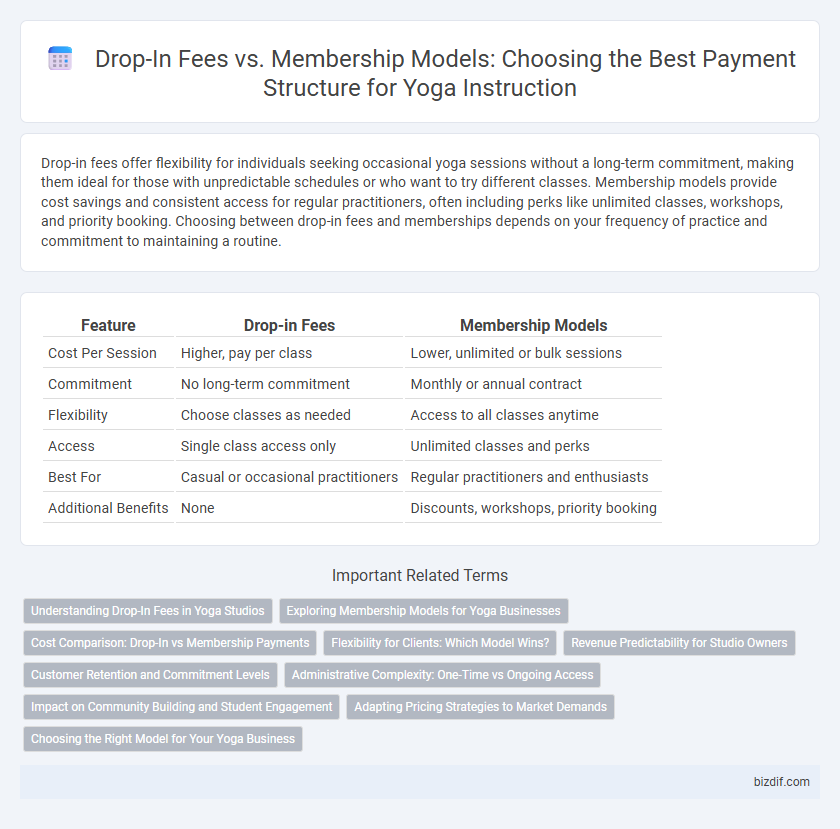Drop-in fees offer flexibility for individuals seeking occasional yoga sessions without a long-term commitment, making them ideal for those with unpredictable schedules or who want to try different classes. Membership models provide cost savings and consistent access for regular practitioners, often including perks like unlimited classes, workshops, and priority booking. Choosing between drop-in fees and memberships depends on your frequency of practice and commitment to maintaining a routine.
Table of Comparison
| Feature | Drop-in Fees | Membership Models |
|---|---|---|
| Cost Per Session | Higher, pay per class | Lower, unlimited or bulk sessions |
| Commitment | No long-term commitment | Monthly or annual contract |
| Flexibility | Choose classes as needed | Access to all classes anytime |
| Access | Single class access only | Unlimited classes and perks |
| Best For | Casual or occasional practitioners | Regular practitioners and enthusiasts |
| Additional Benefits | None | Discounts, workshops, priority booking |
Understanding Drop-In Fees in Yoga Studios
Drop-in fees in yoga studios offer flexibility for students who prefer attending classes sporadically without committing to a long-term contract, typically ranging from $15 to $25 per session. This pay-per-class model allows access to individual sessions, making it ideal for beginners or those with unpredictable schedules. Understanding drop-in fees helps practitioners weigh cost-effectiveness against membership models, which often provide unlimited classes and additional perks for a monthly or annual fee.
Exploring Membership Models for Yoga Businesses
Yoga businesses exploring membership models benefit from consistent revenue streams and increased client loyalty, which supports long-term growth compared to unpredictable drop-in fees. Membership models often include options such as unlimited monthly classes or tiered access, encouraging regular attendance and deeper practitioner engagement. Providing flexible plans tailored to diverse customer needs enhances retention and fosters a committed yoga community.
Cost Comparison: Drop-In vs Membership Payments
Drop-in fees for yoga classes typically range from $15 to $25 per session, offering flexibility without long-term commitment but often resulting in higher overall costs for frequent practitioners. Membership models average $75 to $150 per month, providing unlimited classes and cost savings for regular attendees who practice multiple times weekly. Choosing between drop-in rates and memberships depends largely on individual attendance frequency and budget preferences, with memberships delivering better value for consistent participation.
Flexibility for Clients: Which Model Wins?
Drop-in fees offer unparalleled flexibility for clients who prefer attending yoga classes sporadically without long-term commitments or upfront costs, making it ideal for busy schedules or trial sessions. Membership models provide consistent access and often include perks like discounted rates and priority bookings, appealing to regular practitioners seeking value and routine. For clients prioritizing maximum flexibility, drop-in fees typically win, but those aiming for frequent attendance and savings may find memberships more advantageous.
Revenue Predictability for Studio Owners
Drop-in fees offer flexibility for clients but create revenue fluctuations that challenge financial planning for yoga studio owners. Membership models generate consistent monthly income, enhancing revenue predictability and enabling better budgeting and investment decisions. Implementing membership plans with tiered options can optimize membership retention and maximize stable cash flow.
Customer Retention and Commitment Levels
Drop-in fees offer flexibility and attract casual participants, but memberships enhance customer retention by encouraging regular practice and deeper commitment. Membership models create consistent revenue streams and foster community engagement, which strengthens loyalty and reduces churn rates. Prioritizing memberships supports long-term client relationships essential for sustainable yoga instruction success.
Administrative Complexity: One-Time vs Ongoing Access
Drop-in fees streamline administrative tasks with one-time payment processing per session, reducing bookkeeping and customer management overhead. Membership models require ongoing access control, recurring billing, and tracking attendance, increasing administrative complexity significantly. Managing memberships demands dedicated systems to handle renewals, cancellations, and member engagement efficiently.
Impact on Community Building and Student Engagement
Drop-in fees offer flexibility, attracting occasional visitors but often limiting long-term community bonds and consistent student engagement. Membership models foster commitment, enhancing community building through regular interaction and deeper relationships among members. Studios utilizing membership plans typically report higher retention rates and more active, engaged student communities.
Adapting Pricing Strategies to Market Demands
Yoga studios can enhance profitability by carefully analyzing drop-in fees versus membership models to align with local market demands and customer preferences. Drop-in fees offer flexibility for occasional practitioners, while membership models foster loyalty and steady revenue streams by incentivizing regular attendance. Implementing dynamic pricing strategies that consider factors such as class popularity, time of day, and demographic trends helps optimize enrollment and maximize overall studio income.
Choosing the Right Model for Your Yoga Business
Evaluating drop-in fees versus membership models is essential for tailoring a yoga business to client needs and maximizing revenue. Drop-in fees offer flexibility, attracting casual practitioners and tourists, while membership models promote consistent attendance and stable monthly income through unlimited classes or tiered access. By analyzing local market trends, client commitment levels, and cash flow goals, yoga instructors can select a pricing strategy that balances accessibility with financial sustainability.
Drop-in fees vs Membership models Infographic

 bizdif.com
bizdif.com